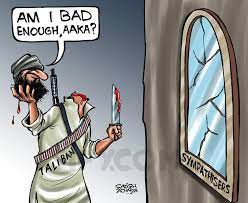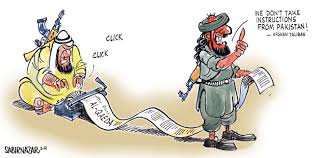
Everyone expects Taliban, supported by Pakistan, which is backed by China to sweep into power in Afghanistan. That is the dark visage floating up. As the US forces are leaving the country, the current momentum and tempo of the Taliban offensive suggests an inevitability of their return. There is sense of return to the bad old days. There is air of despondency in Indian strategic circles, jubilation in some sections of Pakistan, and a large sense of trepidation in the rest of the world. From China emanates the smell of greed and a sense of fear simultaneously. There is an aura of total opacity of what the future holds. However, we have to go back into history to understand what can happen in future.
The international geopolitical scene was far different in the days when Taliban rose to power. One superpower – USSR had been just defeated and was disintegrating. The other superpower – USA just walked away from the region savouring victory in an era of the forthcoming unipolar world. Afghanistan was in a chaotic vacuum after Najibullah was hung on a pole. Radical Islamism was on the ascendancy. Pakistan was in its prime of being a rogue state and its economy was upbeat. ‘Pack-istan’ was the darling frontline state of the West. Its ‘deep state’ which crystallised during the heady days of Zia Ul Haq, sought strategic depth in Afghanistan. The Mujahideen were footloose in Afghanistan. They were morphed into Taliban by aid and abetment of ISI. They had virtually no opposition internally or externally. They were largely unopposed thanks to their Pakistani backers. Externally, people did not care a damn about Afghanistan. Taliban ruled the roost with rustic religious fervour headed by a reclusive cleric who gave sanctuary to Osama Bin Laden and Al Qaeda. However, even then, they could control only 75% of the area. The Northern Alliance opposed them. The Taliban of those days took Afghanistan back to the stone ages with their version of a repressive Sharia. It was one of the poorest countries in the world. Everything changed with 9/11 and collapse of the twin towers. The Taliban was booted out of power by USA.
While the Taliban never withered away and have come back into the reckoning, the ground in Afghanistan has changed drastically. They themselves are no more the rustic religious zealots. They are now a suave outfit, which has its talons in the drugs and mining trade at every bend of the illegal pipeline. The drug economy is significant since it has grown fourfold in cropping area and about tenfold in cash volumes in the last two decades. The Taliban have a major stake in this trade which has been their sustenance. They now seek power and legitimacy. They are now better organised with a leadership structure. While they want to reimpose the Sharia, they are also conscious of their image. The recent videos of their barbarous slaughter of the Afghan Army soldiers and their edicts regarding women have rekindled the bad taste of yesteryears. The Taliban is also conscious of the fact that their main backer, Pakistan is a decrepit failed state, which in turn is backed by a state which wants to be a superpower at least cost but is apprehensive to get involved directly. They also seek international recognition which they will not get if they cannot remove the bad taste they generate.Everyone – Russia, Iran, CARs, India, EU, Turkey, Middle East, Pakistan and China are wary of them for two fundamental reasons. The first being the export of religious extremism and the second being drugs. Both these are the main ingredients of terror. The Taliban is now opposed by a recognised government in power with an organised armed force which seems to be fighting back after the initial shock. The current government is backed by USA and most countries. Most importantly, USA will oppose the Taliban with maximum force unless it is clear that the dispensation in Afghanistan with or without them can be relied upon not to harm its homeland security. They face some formidable opposition. Let us see what the opposition is all about.

In Afghanistan, proxy play by regional and bigger powers has always been a constant; a bankrupt Pakistan is just one among them. Taliban will therefore be clear that Pakistan will ditch it at a moment’s notice if need be. Taliban will also be sensitive to the fact that while Pakistan wants them in the driving seat, it wants to do backseat driving. That will not be acceptable to the Taliban beyond a point. Pakistan, has also fenced the border with Afghanistan. It has also deployed regular army along the border. Pakistan wants to keep the conflict on Afghan soil and airspace and not let it spill to their side. Pakistan is also worried about inflow of refugees, infiltrators in the garb of refugees, movement of Afghan army personnel or Taliban fighters into Pakistan. So there is the love hate angle.
USA has swung into action through air strikes in support of Afghan Forces. Everyone thought that USA has withdrawn from the scene. However as it was surmised and being proven now, USA has shifted from direct to indirect intervention. That opens up many possibilities. One should not forget that USA is no more dependent on Pakistan. It will not hesitate to strike at Pakistan if needed. By denying a base for air operations, Pakistan has put itself in the cross hairs of USA. If Pakistan crosses any red line in operations as per USA’s perception, it will get hit. Be rest assured that Pakistan knows its limit here and so does the Taliban. Now as per the inputs, USA is likely to use one of the CARs as a base and Russia might agree to it. If that happens, the likelihood of outright Taliban success recedes.
As far as China is concerned, it has started protecting itself in Pakistan as per reports. Its engineers and workers in the CPEC projects are being armed for self-protection. So its entry into Afghanistan directly is a bit far away. Will China take the risk to enter this volatility? It is a question mark. So far it has been careful not to fall in that trap. However with US withdrawal moving on schedule, it has appointed a special envoy for Afghanistan. In the meanwhile there is also news that the United States, Kazakhstan, Kyrgyzstan, Tajikistan, Turkmenistan and Uzbekistan have taken a stand that terrorists and third-party forces must never be allowed to use Afghan territory to threaten or attack the CARs. USA, Afghanistan, Pakistan and Uzbekistan have also agreed in principle to establish a new quadrilateral diplomatic platform to enhance regional connectivity. This ties them in with the current Afghan Government and limits Pakistan’s options. It also tells the Taliban that Pakistan is hedging its bets. In the meantime, Russia, Iran and India are also playing their part with the Afghan Government.

All in all the Taliban seems to be isolated to some extent. It’s on ground actions have generated images of its dark past and have stoked deep mistrust. There is no one who seems to be siding Taliban openly or fully. On ground there is no doubt that it has control almost over half of Afghanistan’s 419 districts. However none of the 34 provincial capitals in Afghanistan have been seized by the Taliban, though they have been put under pressure. On the other hand, there is a good possibility that the Afghan forces might consolidate and strike back to regain lost ground, now that the USA has struck with its air force. The Taliban seems to have realised that their position is not as strong as they have made it out. They might not prevail . That is why they have been quick to say that the last round of talks in Doha were ‘positive’. It seems that they are seeking a compromise.
Will the compromise come about? That is a million dollar question. The differences between the two sides are stark. The Afghan side insists on a ceasefire before there can be any real dialogue. The Taliban want President Ghani out of the frame. They insist on establishment of their strict version of a Sharia system. There is also a matter of differing views on an inclusive government comprising all segments of Afghan society and ethnic groups. The Taliban are still holding out on what they interpret as inclusivity or whether they believe in elected democracy. Their views on human rights, particularly on women’s right to education and to work is engulfed in shadows. Their demand for an ‘Islamic emirate’ contradicts their claim that they believe in a pluralistic political system. Hence there is an impasse with no middle ground at present.
Overall a range of possible outcomes in Afghanistan are on the cards. An outcome in which Taliban takes over Afghanistan once USA leaves is not a certainty as is being made out. The chances of a stable government born out of compromise also does not seem bright as of now. The situation could continue in the current state of indecisive to and fro violence for some time and eventually descend into a state of civil war. The possibility is high.Alternately some settlement could take place now. Taliban could be devious enough to agree to some conditions, get into a power sharing agreement to buy time. Once there is a lull and things cool down, the Taliban will undercut the arrangement and cull its opponents through political action and selective coercion and violence. That would be in keeping with its character as also that of its backers Pakistan and China. In my opinion, this is a very feasible option.
At this point of time, the last option of striking a compromise and reneging later seems to be the best option for Taliban. India should discuss this out with the USA, Russia and Iran to come to a common action plan to thwart this design. India will also do well to remember that the Taliban will always be more amenable to Pakistan than India. It is in Indian interest that a hybrid government which is reasonably stable runs Afghanistan. A thought which comes to mind is that will India consider giving basing facilities to USA to carry out operations in Afghanistan if the former can handle overflights over Pakistan. That is an option which should not be ruled out. It will give a strong message to China and Pakistan. However, it will need a lot of political determination to tread this path. In any eventuality, India has a pivotal role to play should any agreement be reached between the Afghanistan government and Taliban. India should be alive to all options and have its plans chalked out.
-The writer was India’s DG Artillery. He is highly decorated and qualified with vast operational experience. He contributed significantly to the modernisation and indigenisation of Artillery. He is now a Professor in the Aerospace Department of IIT Madras and is involved in applied research for defence technology. The views expressed are personal and do not necessarily reflect the views of Raksha Anirveda








